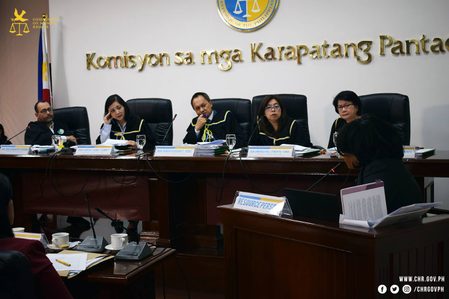SUMMARY
This is AI generated summarization, which may have errors. For context, always refer to the full article.

MANILA, Philippines – Ask anyone from the Commission on Human Rights (CHR) to describe their workplace, and their answer will be variations of the same: that it’s a government agency that does so much but has so little.
The high expectations are neither unfounded nor unfair. The CHR, after all, is the country’s national human rights institution that was primarily established following the cruel and violent dictatorship of Ferdinand E. Marcos. It has since been dealing with abuses committed by the state, and under the Rodrigo Duterte presidency, has been in the crosshairs of the government.
CHR persevered to fulfill its role, but has constantly pointed out internal issues that seem to aggravate the challenges it faces: small financial resources, short-staffed offices, and general lack of clarity in terms of how to carry out the commission’s mandate.
Experts, activists, and even career officials point out that a separate charter for the CHR is one of the main things that could address all these problems. But what does it mean, even?
What is a charter?
Lawyer Michael Yusingco, a senior research fellow at the Ateneo School of Government, said that a charter allows an entity to enjoy “a certain degree of autonomy,” giving it “something to hold on to, something specific” that could help in plotting its path forward.
Several examples of bodies that have their own governing law include the Office of the Ombudsman with Republic Act 6770 and chartered cities across the Philippines, among others.
Yusingco explained that it means that these bodies are not “tied down to the general law.”
“For instance, the Local Government Code or the Administrative Code… of course they still apply because they are still laws but they become secondary in the sense to the charter,” he said.
Isn’t the Constitution enough for the CHR?
The CHR, as we know it now, was established under the 1987 Philippine Constitution following the ouster of Marcos in 1986. Its full power and functions, including its role in Philippine society, are stated in Article 13, Section 17.
Yusingco described the existing provisions about the CHR as “already groundbreaking, revolutionary,” but, just like many of the country’s laws, the issue lies with implementation.
“I would say our CHR framework or structure is progressive, however, the application of those provisions in real life is a totally different matter altogether,” he said.
How can the CHR get its own charter?
The CHR’s charter will have to go through the legislative process in Congress and signed by the president, just like any other proposed legislation.
There are three proposed measures at the House of Representatives, filed by Parañaque City 2nd District Representative Gus Tambunting, Manila 6th District Representative Benny Abante, and Cagayan de Oro 2nd District Representative Rufus Rodriguez.
At the Senate, only Senator Robin Padilla has filed a proposed measure seeking to give CHR its own charter through Senate Bill No. 2440. In his explanatory note, Padilla said the commission has “endured its limitations” in carrying out its mandate so it is “imperative to further strengthen its mandates, powers, and functions and clearly establish its cardinal role in cultivating a culture of human rights in the country.”
“A just and democratic country cannot be attained without a truly independent national human rights institution,” Padilla said in a statement.
All bills are currently still at the committee level.
Read the full proposed charter here, based on Padilla’s bill:
Why does the CHR even need a charter? What will it look like?
Since its establishment in 1987, CHR has continuously faced several challenges that affect the way it carries out its mandate. This was highlighted during the Duterte administration where the commission was taken to task to investigate the thousands of killings under the violent war on drugs, all while also being attacked by the former president himself and his allies.
And while Duterte has left office, his impact continues to reverberate through Philippine society, particularly with the persistent culture of impunity where justice remains out of reach for drug war victims.
In a separate statement on September 21, the CHR said that “through an enabling charter, the commission can be expected to amplify what it has endeavored to achieve in its more than three decades of existence.”
“Previously regarded as a ‘toothless tiger,’ the passage of [a charter] will give teeth to the commission through the full realization of its independence and the clear establishment of its role as a watchdog, monitor, advocate, and educator of the government,” it said.
Lawyer Gemma Parojinog, director of CHR’s human rights policy advisory office, told Rappler that a separate charter for the commission would lead to a “more effective and responsive national institution to keep up with the challenges in society.”
But Yusingco noted that a charter does not automatically make “a better organization or a much improved entity,” considering that it really highly depends on the provisions as well as implementation.
But what does the charter lay out in terms of the CHR’s powers and functions?
Specifically, the charter can do three main things, among others:
1. Deals with issues of independence
Parojinog said that incidents involving misconception about CHR’s function and independence highlight the need for a separate charter that could more explicitly lay out their mandate.
For example, during Duterte’s time, many elected officials accused CHR of protecting criminals and intervening in the government’s anti-drug campaign. Duterte, then the chief executive himself, even threatened to abolish the commission.
“There are always government agencies questioning why we’re doing what we’re doing so now I think that with this charter, it’s going to be clear that we are able to do what we’re supposed to do,” Parojinog said.
2. Assert fiscal autonomy
CHR always grappled with challenges that could’ve been addressed by bigger budget appropriations from the government. But every year, the commission often gets a small budget allocation. For 2024, CHR is allotted only P976 million in the National Expenditure Program, or P1 billion less than the commission’s original proposal of P1.924 billion. This is also a P25.6 million decrease from 2023’s P1 billion.
So in budget deliberations both in the House of Representatives and the Senate, the commission often had to rationalize why it needed more funding. Just this September, CHR said that this year’s big decrease could affect how it provides financial assistance to victims of human rights violations, including families of those killed under Duterte’s drug war.
Parojinog said that a charter will “finally clear any doubts” with respect to resources given to the commission.
Section 4 of CHR’s proposed charter, which underlines the commission as an independent office, explicitly states that it “shall enjoy full fiscal autonomy” and that “appropriations for the commission shall not be reduced and shall be automatically and regularly released.”
CHR’s requests for additional funding are usually granted since several legislators would support these. However, there were instances during the Duterte years when the commission’s budget was used against it.
To recall, in 2017, the House of Representatives voted to give CHR a budget of P1,000 for 2018 in response to the commission’s tough stance against Duterte’s violent policies. This threat was retracted, thanks to the overwhelming public support that called for hard-earned taxes to be allocated to the embattled commission.
Still, this incident showed how CHR can be vulnerable to more threats in terms of budget deliberations. With its own charter, CHR hopes to make itself stronger and more financially independent too.
3. More power with investigations
CHR is mandated by the 1987 Philippine Constitution to “investigate, on its own or on complaint by any party, all forms of human rights violations involving civil and political rights.”
In relation to its power to investigate, the CHR charter will allow the commission to “compel the attendance of witnesses and the production of witnesses… [and] issue subpoenas.” It will also be able to cite for contempt any person for violating the commission’s lawful orders.
This can address the long-running issue faced by CHR when it comes to obtaining documents and reports for its own investigations. In a May 2022 report, the commission said that its investigations into Duterte’s drug war were “hampered by the predilection and uncooperativeness” of government agencies, when subpoenas and requests for information were often “refused, denied, or ignored.”
“We’re supposed to conduct investigations but with some government agencies, [they’re] always pushing back and would not let us have copies of the reports, would not let us go inside for our jail visits, so all of this would be cleared in matters of ensuring that we be able to implement our powers under this charter,” CHR’s Parojinog said.
Parojinog also highlighted one specific CHR provision that will allow the issuance of mandatory protection orders (MPOs) that, according to the proposed law, can direct state agents and even private bodies to give protection to witnesses and victims of human rights violations.
Why did past efforts fail to get CHR charter?
Former commissioner Karen Gomez-Dumpit, who worked in the CHR for close to three decades before retiring in 2022, said that pushing for its own charter was always on the table for the commission.
Each Congress, CHR would lobby with lawmakers, but a quick look at Congress records showed that many of these bills never progressed past the committee level in both the House of Representatives and the Senate.
Dumpit said the closest the CHR got to getting its charter was when a proposed CHR charter bill authored by then-Quezon 4th District representative Lorenzo Tañada III hurdled the House of Representatives during the 14th Congress in 2009. It did not progress in the Senate, whose proposed bills filed by then-senators Jamby Madrigal, Antonio Trillanes IV, and Francis Escudero remained pending at the committee level.
Under Duterte, getting its own charter was already one of the priorities of the CHR leadership. But it was a tense time for the commission as it dealt with state killings and threats to its own existence. Meanwhile, then-CHR chairperson Chito Gascon was also attacked by Duterte himself and his allies.
“While we wished for the charter, it was only wishful thinking,” Dumpit told Rappler. “Our proposal never saw the light of day…remember that we were avoided by many in the government because of [Duterte]’s disdain and demonization of the CHR.”
Parojinog echoed this thought, stating that they were concerned that pushing for a CHR charter during the tumultuous era of Duterte could lead to Congress watering down the commission’s powers.
“What we’re trying here in the charter is to provide a more clear definition of what our powers constitute,” she said.
“So essentially we don’t want it watered down so…we were very concerned that if we pushed for it back then, they might include provisions that would be contrary to our standard as a national human rights institution,” Parojinog explained.
Are there better chances now to pass the CHR charter?
CHR is in a better position now, compared to under the Duterte administration. The usually-embattled commission is no longer openly targeted by allies and does not have to worry about being abolished.
While it is still excluded in matters related to the drug war, CHR Chairperson Richard Palpal-latoc previously said that the commission enjoys good engagement with government bodies on other issues.
They hope to tap this good standing in pushing for their priority legislations, including the CHR charter. For Parojinog, the response of lawmakers when they reach out is a good sign.
“Every legislator that we’ve been to – they seem to be receptive and very open to looking into the charter and hopefully supporting it in the future,” she said.
But while it looks like that the CHR has “better chances now” getting its own charter, Dumpit said that there are a lot of factors that need to be taken into consideration.
“Right timing is key to having the charter, sincerity of the [Marcos administration], and the political will to guarantee the full functioning independence of the CHR,” she said. – Rappler.com
1 comment
How does this make you feel?


![[Just Saying] Demonizing divorce and the mockery of our Constitution](https://www.rappler.com/tachyon/2024/06/TL-Demonizing-divorce-mocking-constitution-June-6-2024.jpg?resize=257%2C257&crop=265px%2C0px%2C720px%2C720px)













![[OPINION] Power of mimicry: How human rights are covertly undermined in PH](https://www.rappler.com/tachyon/2024/06/duterte-marcos-human-rights.jpg?resize=257%2C257&crop_strategy=attention)









The internal challenges faced by the Commission on Human Rights (CHR) such as “small financial resources, short-staffed offices, and general lack of clarity in terms of how to carry out the commission’s mandate” showed the Marcos Jr. Government’s lackluster support to this office. But, this should NOT be surprising because the CHR “was primarily established following the cruel and violent dictatorship of Ferdinand E. Marcos.” While Marcos Jr. loves his father’s Kadiwa, Masagana 99, etc., he more likely “secretly” hates this Office which was created because of the human rights violations under his father’s dictatorship. Secondly, its mandate is more likely an impediment to the covert operation of the Marcos-Duterte Repression Machinery. Hence, the Marcos Jr. Government’s lackluster (if not “secretly” hateful) attitude towards the CHR should not be surprising at all.